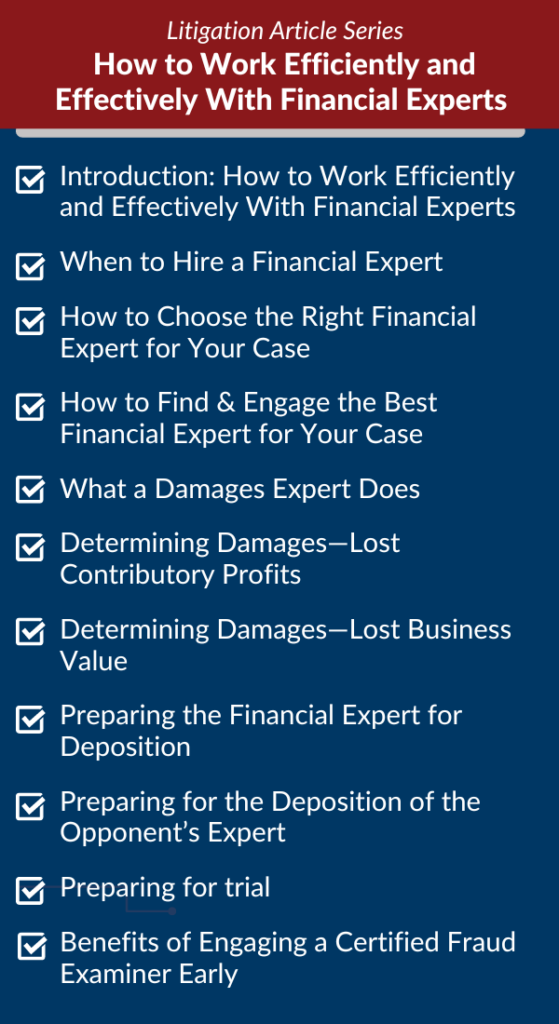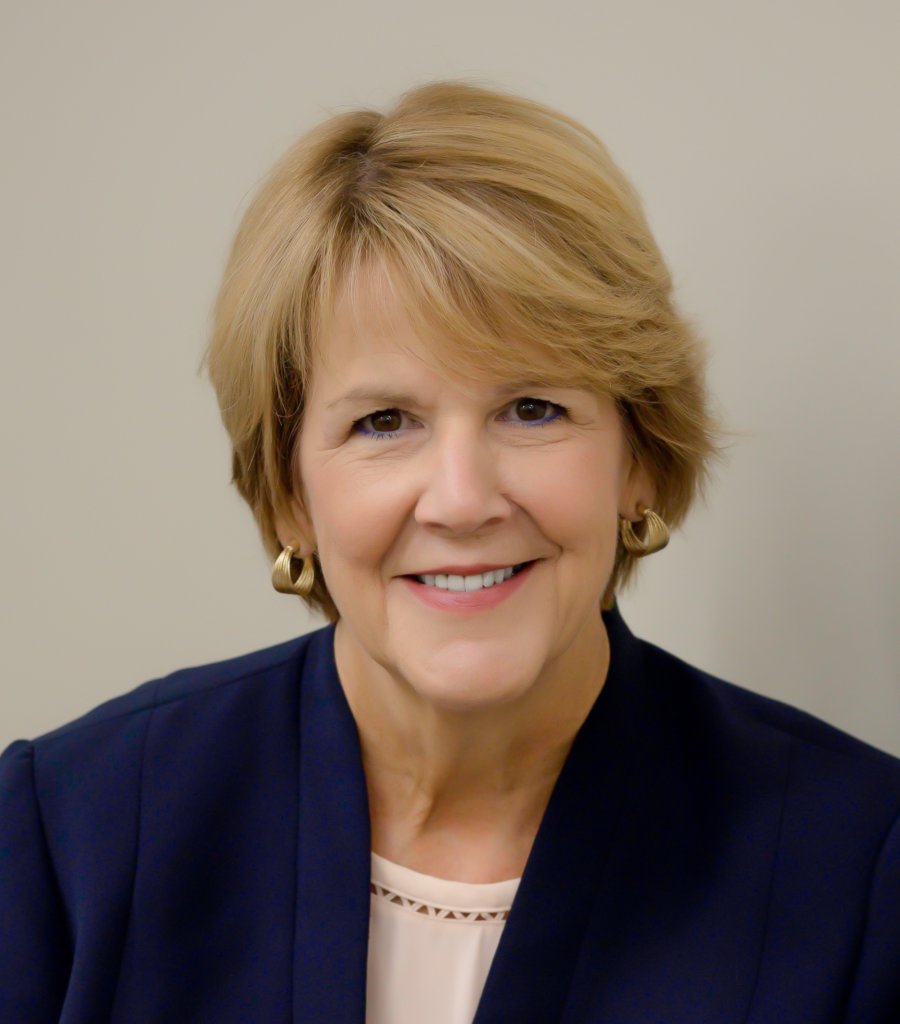
Litigation Article Series Wrap-Up: How to work Efficiently and Effectively With Financial Experts
Throughout this article series on working with financial experts in litigation, we have explored how to work effectively and efficiently with expert witnesses in cases involving a business that has been damaged or whose owners disagree on the value of the business.
The 10 articles in this series covered the four phases of working with a financial expert during a case and shared insights on successfully navigating each of these phases:
- 1. Hiring the Expert – Who, when and how to find the right person.
- 2. What a Damages Expert Does – How a financial expert thinks, why the type of documents needed varies by case, and how damages are most often determined.
- 3. The Deposition – Tips on how to prepare your expert and depose an opposing expert witness.
- 4. Mediation, Arbitration or Trial – Preparing your expert for testimony and cross-examining your opponent.
In this final article of the series, we will give a brief recap of each article, along with links for easy reference if you would like to re-read a particular topic.

Article 1 Recap: When to Hire a Financial Expert
“When” is one of the most critical elements in hiring a financial expert for any litigation case involving financial damages or business valuation. This article explores how the timeline of hiring a financial expert can impact your business litigation case, either positively or negatively. The best time to hire a financial expert is as early as possible, preferably before you are required to disclose them as your expert.
Hiring the expert early gives you 2 important options, which we explore in more detail in the article:
- 1. Flexibility to serve as a consultant first
- 2. Time to consider different alternatives
We also share a case study that illustrates this. Avoid the major (but unfortunately common) mistake of bringing in an expert late in discovery in an attempt to support a conclusion you’ve already calculated. This “11th hour request for seal of approval” usually backfires.
Read the full article here: Litigation Article 1
Article 2: How to Choose the Right Financial Exert for Your Case
After the “when” of choosing a financial expert for your case comes “who.” This article explores how to choose the best expert for your case based on evaluating their credentials, credibility, independence, relevant experience, and communication skills.
We dive into the credentials and certifications related to business damages that are helpful in evaluating a potential expert, including SEAK, fraud examiner training, ASA (Accredited Senior Appraiser) and more. The article also looks at how to evaluate an expert’s credibility and character to assess how they may come across in court.
Independence is a critical characteristic for an effective witness, and we share how to assess this. In addition, the article addresses how to ensure the potential witness has the appropriate experience, demeanor and communication skills for courtroom presence and “jury appeal”—all of which are just as important as their professional credentials.
Read the full article here: Litigation Article 2
Article 3: How to Find & Engage a Qualified Financial Expert for Your Case
Since we shared the type of credentialed person to look for as an expert witness in the previous article, this article gets into the specifics of where you can look to find this person.
We discuss 6 ways to find a financial expert witness, including links to additional resources. The most common method is through referrals from other attorneys you know and respect at your firm or outside your firm, but there are other avenues as well.
The article also reveals 10 important questions to ask any potential financial expert witness, so you can evaluate their suitability for your case in areas such as independence, training, experience, work process, billing rates and more. Spotting red flags early in the process can save everyone time, effort and money.
Read the full article here: Litigation Article 3
Article 4: What a Damages Expert Does
Understanding what a damages expert does—and doesn’t do—can be helpful for counsel. This article dives into the work of a damages expert and how the selected expert determines which approach to apply in a particular damages analysis. We also discuss the benefits of hiring a potential expert witness as a consultant first, which allows the expert time to consider different approaches early on.
In most cases, one of two primary approaches is used:
- 1. Determining lost business (contributory) profits
- 2. Determining lost business value
These analyses may seem simple on the surface but can be extremely complex and require a number of documents specific to the case at hand as well as a skilled financial expert.
Read the full article here: Litigation Article 4
Article 5: Determining Damage – Lost Contributory Profits
This article takes a closer look at one of the two primary damages approaches—determining lost contributory profits—and how a damages expert applies this approach.
Lost contributory profit analysis is frequently used when a business has been damaged or a business segment has been destroyed, but the business itself remains viable. The expert considers the following:
- The lost revenue stream associated with a particular contract, product or customer.
- The direct expenses that are “saved” because of lost revenue; for example, raw materials and/or direct labor.
- Sales commissions and other operating expenses directly related to lost revenues.
The expert also chooses a reasonable time period for projections and determines the discount rate for calculating the present value of such damages. We explore these concepts in detail.
Read the full article here: Litigation Article 5
Article 6: Determining Damages – Lost Business Value
The second primary damages approach, lost business value, is used when the alleged damaging event has resulted in the end of the business, whether an immediate destruction of the business or a slow demise.
In this article, we look closely at how a damages expert measures the loss of business value by determining fair market value of the business just before the alleged damaging event. The expert can consider prior business plans and forecasts completed by management, historical performance, and industry benchmarking data. This article covers the steps the expert takes to arrive at a reasonable conclusion of lost business value.
Each case is unique. An expert will gather internal and external facts to develop a valuation model and opinion that is objective and supportable.
Read the full article here: Litigation Article 6
Article 7: Preparing the Financial Expert for Deposition
Deposition is a crucial piece of discovery that should never be left until the last minute. It requires careful preparation and collaboration between the financial expert and counsel. The overall goal is for the expert to display the three C’s when testifying: Credibility, Clarity and Conviction.
This article looks at how to make sure you provide both the witness and yourself enough time to prepare, and explores tips on how to prepare each person effectively. We provide detailed checklists to review when working with the financial expert to prepare for deposition.
Read the full article here: Litigation Article 7
Article 8: Preparing for the Deposition of the Opponent’s Expert
Continuing with preparing for deposition, this article looks at how to prepare for deposing the opponent’s financial expert. We consider ways to get meaningful answers to questions asked and avoid potentially being taken advantage of by the opponent’s financial expert.
The article shares how attorneys can prepare before deposition, including reviewing the opposing financial expert’s report to avoid receiving answers that are vague or overly technical. Also included are detailed lists of reasons for a deposition and suggestions for specific areas that should be covered.
Deposition of the opponent’s expert is an opportunity to gain an understanding of the opposing expert’s demeanor, timeline, documents, assumptions, and more. Deposition is more of a fact-finding mission than a time to challenge the opponent’s expert, which could tip the opponent off to a possible issue prior to trial.
Read the full article here: Litigation Article 8
Article 9: Preparing for Trial
This article explores how to prepare your expert witness for trial, as well as provides suggestions for cross-examining the opponent’s expert. We share some tips and a list of actionable strategies for trial preparation that we have compiled based on our 45+ years of experience in state and federal courts.
Just as you prepare to cross-examine the opponent’s expert, the opponent’s counsel will prepare before cross-examining your expert. They may look into your expert’s professional background, past clients, previous reports and more. Refer to our list of suggestions in the article to help make sure your expert is ready for cross-examination.
Read the full article here: Litigation Article 9
Article 10: Benefits of Engaging a Certified Fraud Examiner Early
Engaging an expert in financial forensics is one of the most important steps in litigation cases involving fraud. This article discusses Certified Fraud Examiners (CFE) in detail and explores the benefits of engaging them early in the litigation process. A CFE can also help narrow the scope of an investigation and potentially save expenses.
Read the full article here: Litigation Article 10
In Conclusion
We hope this in-depth article series gave you a look into the financial expert’s world and will serve as a helpful resource now and in the future. Bookmark it and refer back the next time you have a case that involves a contract dispute, breach of contract, intellectual property dispute, interference with fair dealership relationships, dissenting stockholder actions, anti-trust actions for predatory pricing, price-fixing, etc.
With our firm’s 45+ years of experience working with plaintiff’s or defendant’s counsel and focused exclusively on calculating damages for litigation and business valuation, we use our expertise to form effective working relationships with attorneys so you can best serve your clients.
Remember, we are here to help. If you have further questions about how to evaluate a financial expert, or have a particular situation you would like to discuss, give us a call. We are happy to have a complimentary initial discussion.
Would other people in your firm find value in this topic? They can subscribe to our email list here.

Cathy Durham is a principal of Capital Valuation Group, Inc., headquartered in Madison, WI. Capital Valuation Group has been helping business owners across the country understand, increase and unlock the value of their businesses for over 45 years through keynote speaking, valuation analysis, determining damages and providing expert witness testimony. Cathy welcomes conference and event speaking inquiries and can be reached at cdurham@capvalgroup.com. Phone 608-257-2757
